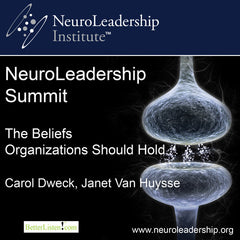Menu
 This fascinating transcribed excerpt from "The Beliefs Organizations Should Hold" with Carol Dweck and Janet Van Huysse recounts a research experiment where kids were either told how intelligent they were or how hard they worked. Guess which ones performed better in the end?
This fascinating transcribed excerpt from "The Beliefs Organizations Should Hold" with Carol Dweck and Janet Van Huysse recounts a research experiment where kids were either told how intelligent they were or how hard they worked. Guess which ones performed better in the end?
I want to tell you about some studies we did that show how tuned in kids are. In one study with adults, we started giving a math lesson to them that was full of genius talk, the geniuses who invented that, who discovered that theorem. And to other adults, we talked genius but in a different way. We talked about people who have fallen in love with math, and just worked at it passionately and eventually discovered these theorems. The genius talk, the boring genius talk -- boy, did that create a fixed mindset. And when we gave some hard problems to the people, they really were not resilient because they thought, “Oh, there are a few people – geniuses -- who are good at this; then there’s the rest of us”. But, in passion… if being a math person is about passion, they remained persistent and resilient.
But probably the most shocking [element] of our research has been about the impact of praise on mindsets. We undertook this at the height of the self-esteem movement when the gurus were telling us to praise everyone lavishly and constantly. So we took, in this study with adolescents -- we did it with hundreds of kids all over the country, and we brought them one at a time to a room in their school. We gave them ten problems from a non-verbal IQ test, and they did pretty well. We made sure they did pretty well. And then we gave them one sentence of praise. A third of them were praised for their intelligence: “WOW! You must be smart at this!”. A third were praised for the process they engaged in. It could be their strategy, their focus, their effort, in this case, effort: “WOW! You must have worked really hard!”. So we focused on the process that brought about their success. And then a third group, just for purposes of comparison: “WOW! That’s really good”. What happened? First of all, one sentence of praise put them into different mindsets. Just saying “You’re really smart” says “I value smarts. I value genius”. This is a culture of genius, and whoa, into a fixed mindset they went. But the most shocking thing to us was that the one sentence of intelligence praise made students into non-learners. We then gave them that choice: “What do you want to do now -- something in your comfort zone or something really hard you could learn from?”, the majority of people praised for intelligence, (and it’s been done with adults, too) chose something in their comfort zone. They did not want to risk their newly minted gifted label. However, the overwhelming majority of those praised for their process in two of our studies, over 90% chose a hard task that they could profit from, learn something from. What happened to their performance? We gave everyone a very difficult set of problems, and then we looked at their performance on somewhat easier problems following that. Those praised for intelligence crashed after the hard problems. Their performance on this IQ test really suffered. But those praised for process had kept on working hard and being engaged in the hard problems, so when they became easier again, their performance flourished. But there was something even more amazing. We told them we were taking this test to another school, and don’t put your name on this piece of paper, just write a few lines about your experience. And then we left a space for them to report their scores. Would you believe that almost 40% of the students praised for intelligence lied, and only in one direction. What does this mean? They are writing to someone they don’t know, they’ll never meet, they didn’t put their name on the paper. I think it means that in a fixed mindset environment, a mistake is so humiliating, so undermining, they can’t even admit it to themselves. That’s not what happens in a learning organization.
Click here for a free preview and to order.
The NeuroLeadership Institute Collection
Sign up for our newsletter and be the first to know about coupons and special promotions.
Live speakers, yoga and more. Click here for details.
© 2025, BetterListen!
